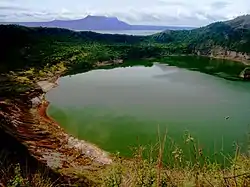| Main Crater Lake | |
|---|---|
| Yellow Lake | |
 The lake prior to the 2020 eruption of Taal Volcano | |
.svg.png.webp) Main Crater Lake Location within the Philippines | |
| Location | Batangas |
| Coordinates | 14°00′35″N 120°59′54″E / 14.00972°N 120.99833°E |
| Type | Crater lake |
| Primary inflows | Taal Lake |
| Primary outflows | Taal Lake |
| Catchment area | Taal Lake |
| Basin countries | Philippines |
| Max. length | 1 km (0.62 mi) |
| Max. width | 1.9 km (1.2 mi)[1] |
| Surface area | 1.2 km2 (0.46 sq mi) |
| Average depth | 100 m (330 ft)[2][3] |
| Max. depth | 172 m (564 ft)[2] |
| Water volume | 24.256×109 m3 (856.6×109 cu ft) |
| Shore length1 | 115 km (71 mi) |
| Surface elevation | 4 m (13 ft) |
| Islands |
|
| Settlements | |
| 1 Shore length is not a well-defined measure. | |
Taal Volcano Main Crater Lake (IPA: [taʔal]; or simply Main Crater Lake[3]), historically known as Yellow Lake,[4] is a lake inside the main crater of Taal Volcano. The origin of the lake is uncertain but is thought to have formed by rainwater. The lake briefly disappeared after the 2020 eruption of Taal Volcano.[5][6]
There is an island inside of Main Crater Lake, called Vulcan Point.
History
Disappearance
After the January 12, 2020, eruption of Taal Volcano, satellite images showed that the water in Main Crater Lake had disappeared.[7][8] Although the main cause of its disappearance is unknown, it is suggested that the water must have dried up due to the fissures that formed after the eruption.[7] The lava beneath the volcano may also have contributed to the evaporation of the lake.[5]
After Taal Volcano calmed down, a series of typhoons allowed rain to re-accumulate and reform Main Crater Lake.
Geography
Vulcan Point
.svg.png.webp) Vulcan Point Location within the Philippines | |
| Geography | |
|---|---|
| Location | Taal Volcano |
| Coordinates | 14°00′35″N 120°59′54″E / 14.00972°N 120.99833°E |
| Adjacent to | Main Crater Lake |
| Administration | |
Philippines | |
| Region | Calabarzon |
| Province | Batangas |
| Municipalities | San Nicolas |
| Demographics | |
| Population | 0 (uninhabited) |
Vulcan Point Island, or simply Vulcan Point, is a small rocky island inside of Main Crater Lake which was once covered with vegetation before the 2020 eruption, which it survived. It is one of only a few islands in a lake on an island in a lake on an island in the world.[9] It projects from the surface underneath Main Crater Lake, which was the remnant of the old crater floor that was filled in by the lake.
References
- ↑ Gavilan, Jodesz (January 13, 2020). "FAST FACTS: What you should know about Taal Volcano". Rappler. Retrieved February 1, 2020.
- 1 2 "Lake Taal". International Lake Environment Committee. Archived from the original on March 6, 2012. Retrieved March 17, 2012.
- 1 2 "Taal Volcano". Philippine Institute of Volcanology and Seismology. Retrieved February 1, 2020.
- ↑ U.S. Army Corps of Engineer (1954). "Manila (Topographic map)"". University of Texas in Austin Library. Retrieved August 3, 2014.
- 1 2 "Philippines Taal Volcano has lost its Main Crater Lake". The Washington Post. January 17, 2020. Retrieved February 1, 2020.
- ↑ "Image shows ash, lava visible at Taal Volcano's main crater". GMA News. January 23, 2020. Retrieved February 1, 2020.
- 1 2 "Dramatic Changes at the Heart of Taal Volcano Spied by Satellites". Retrieved February 2, 2020.
- ↑ "Taal volcano's inner lake all but gone in eruption". BBC News. January 16, 2020. Retrieved February 2, 2020.
- ↑ "Some interesting islands and lakes". Elbruz. Archived from the original on September 19, 2013. Retrieved February 1, 2014.